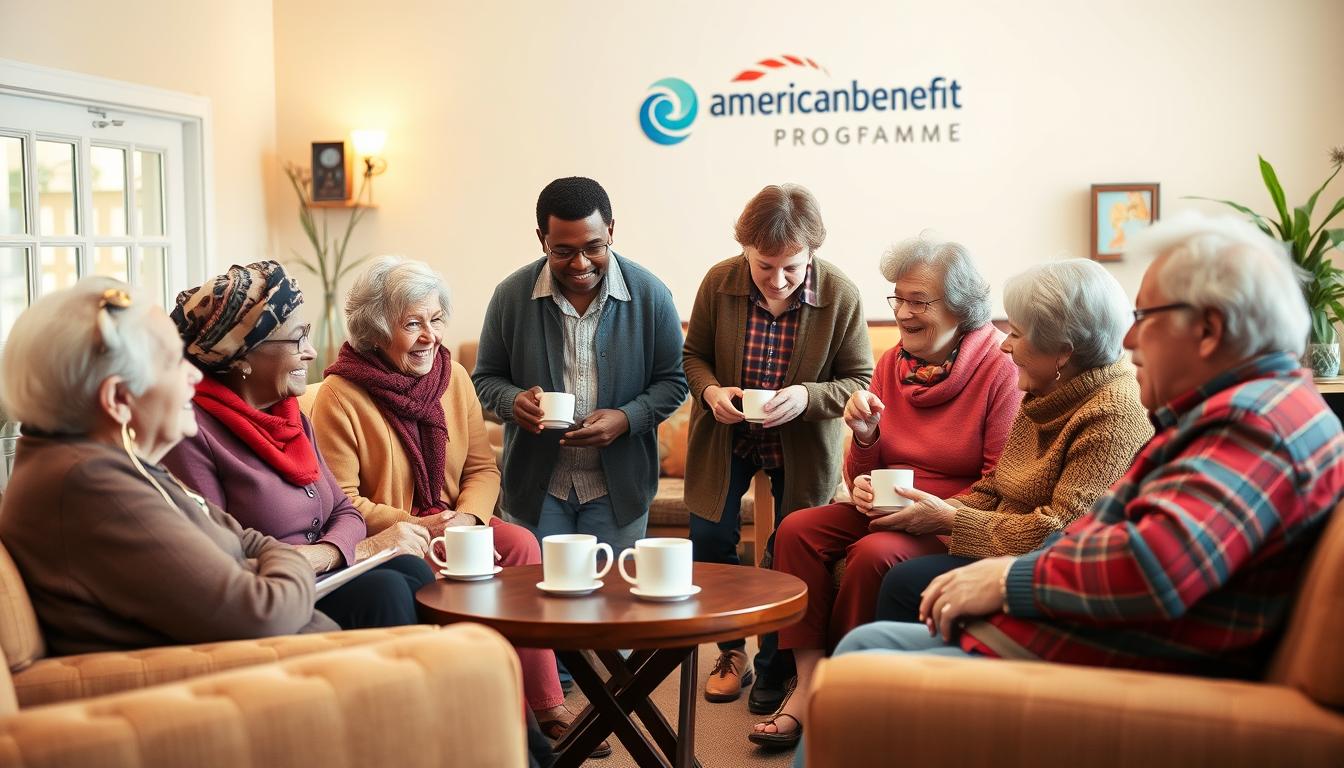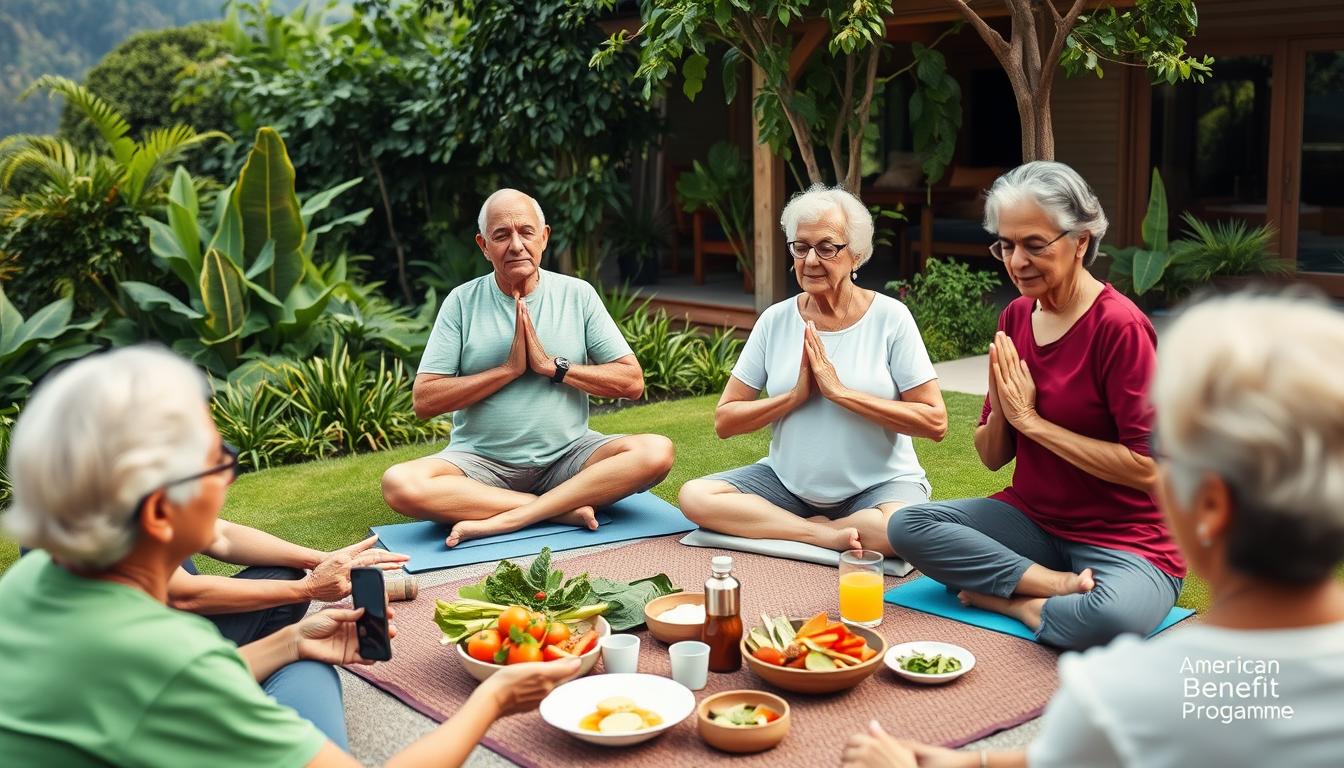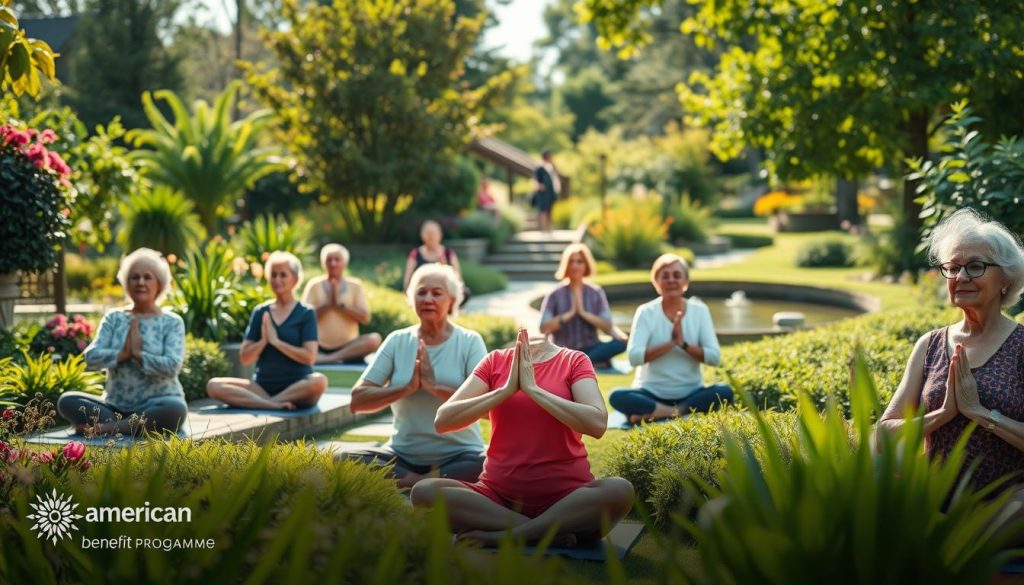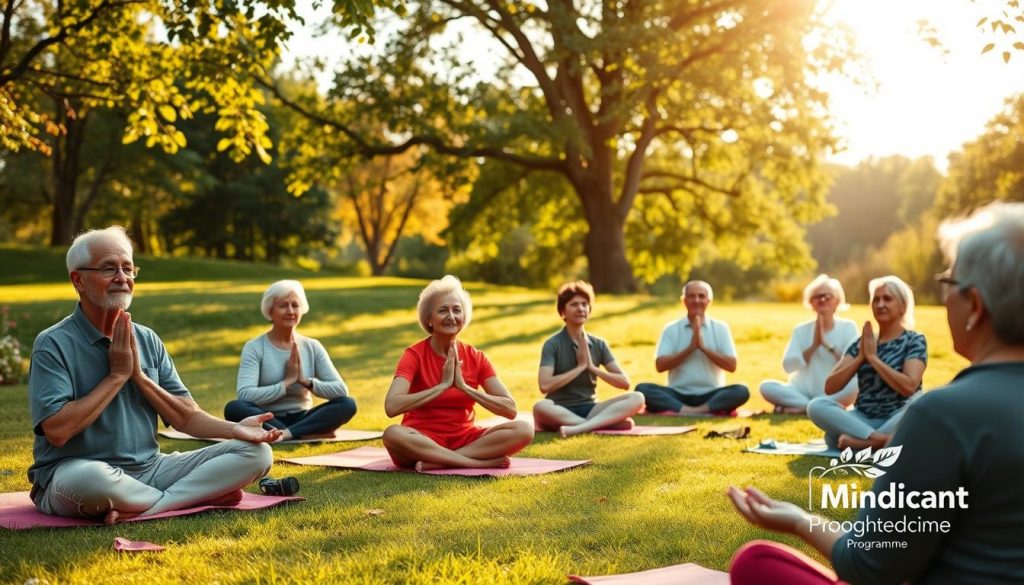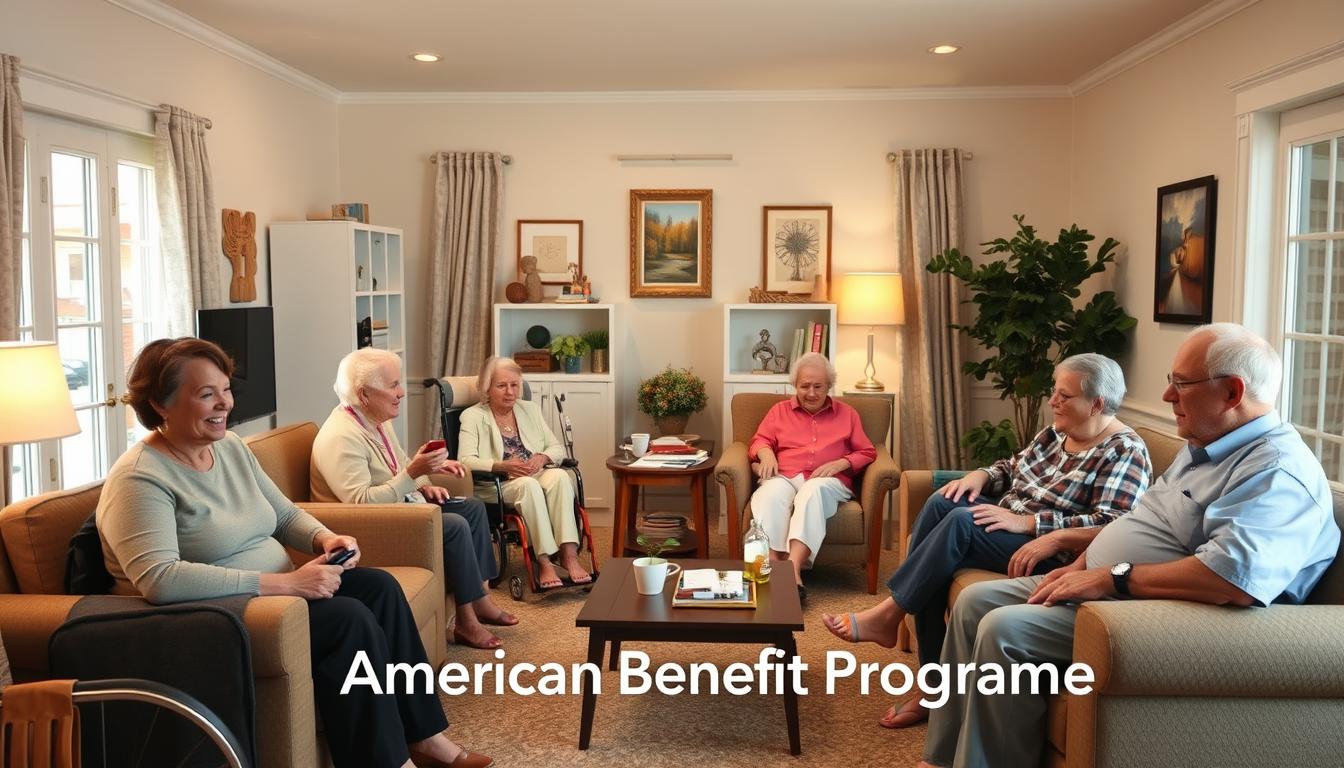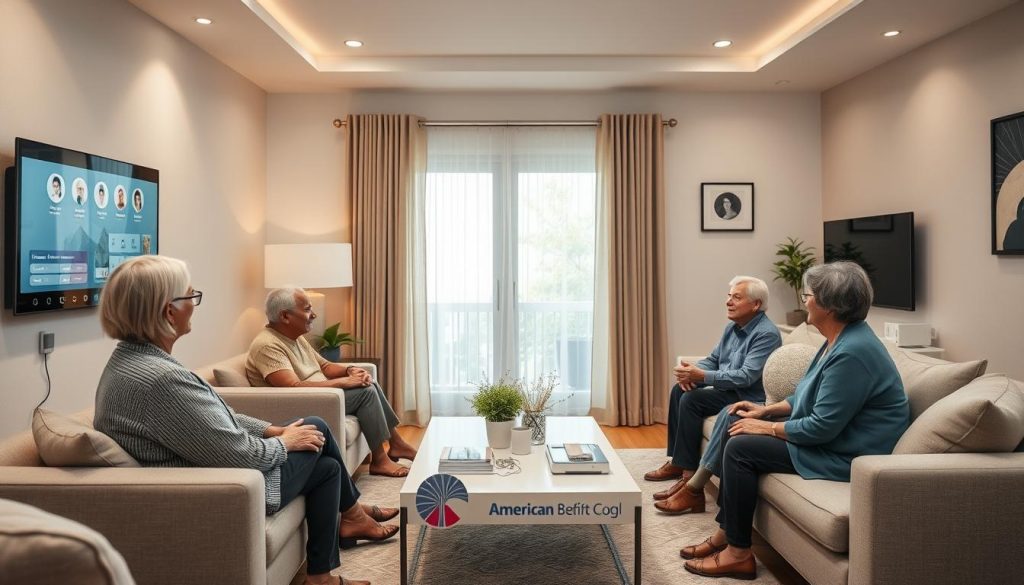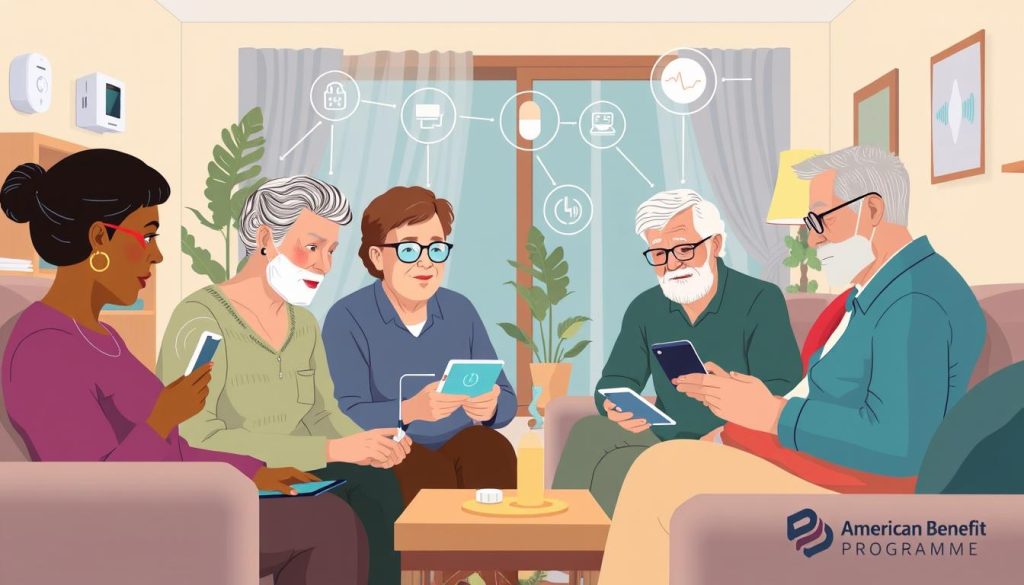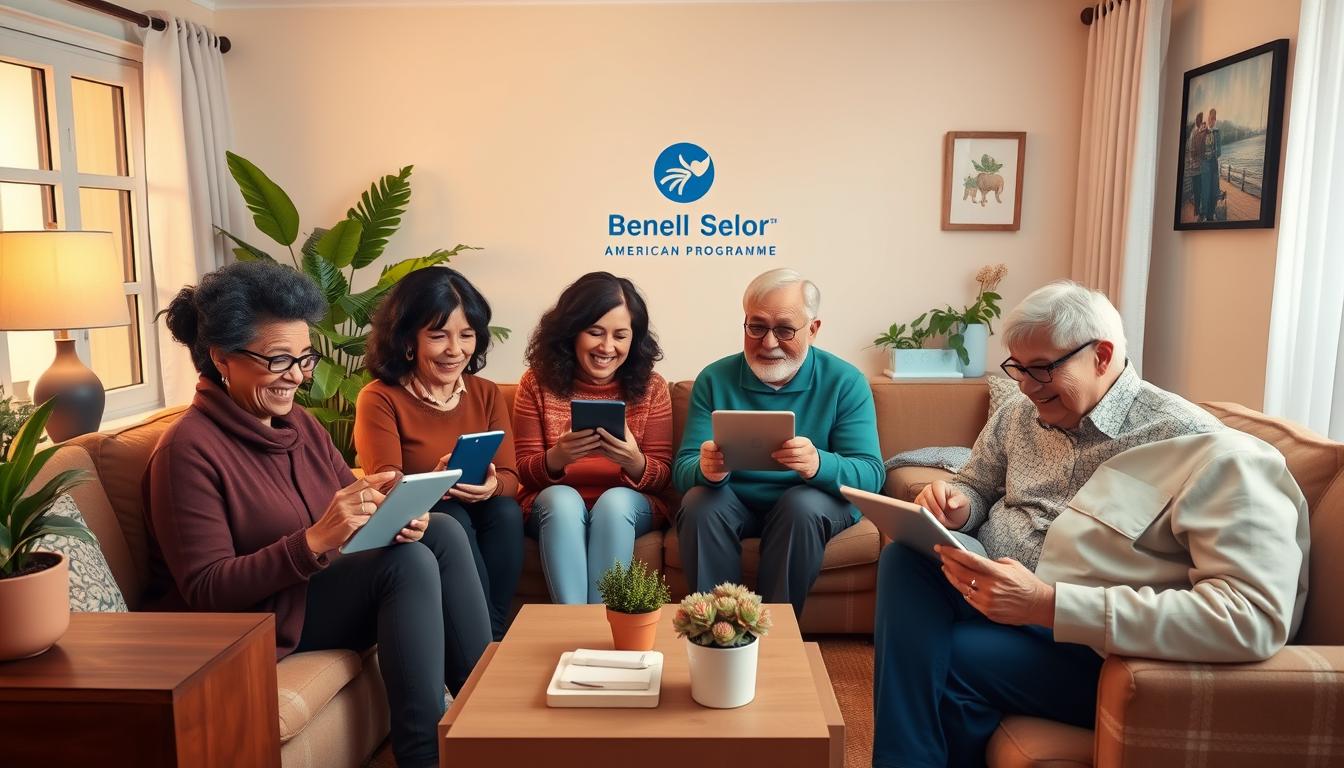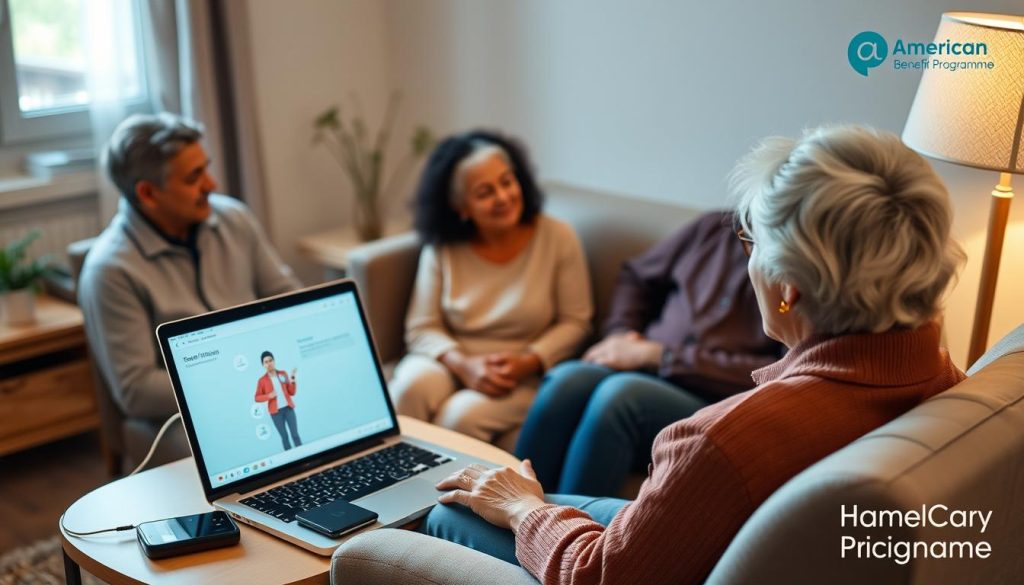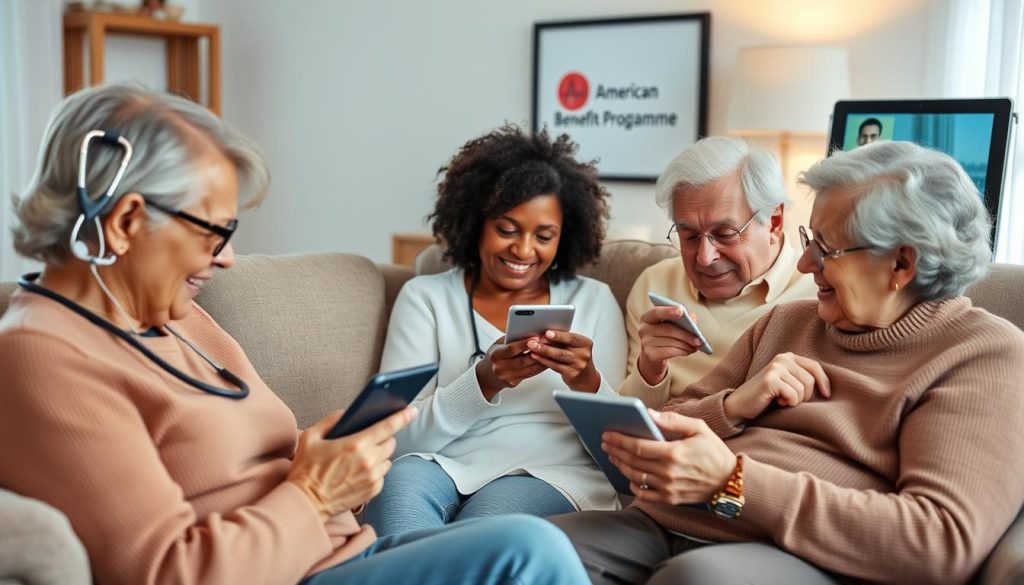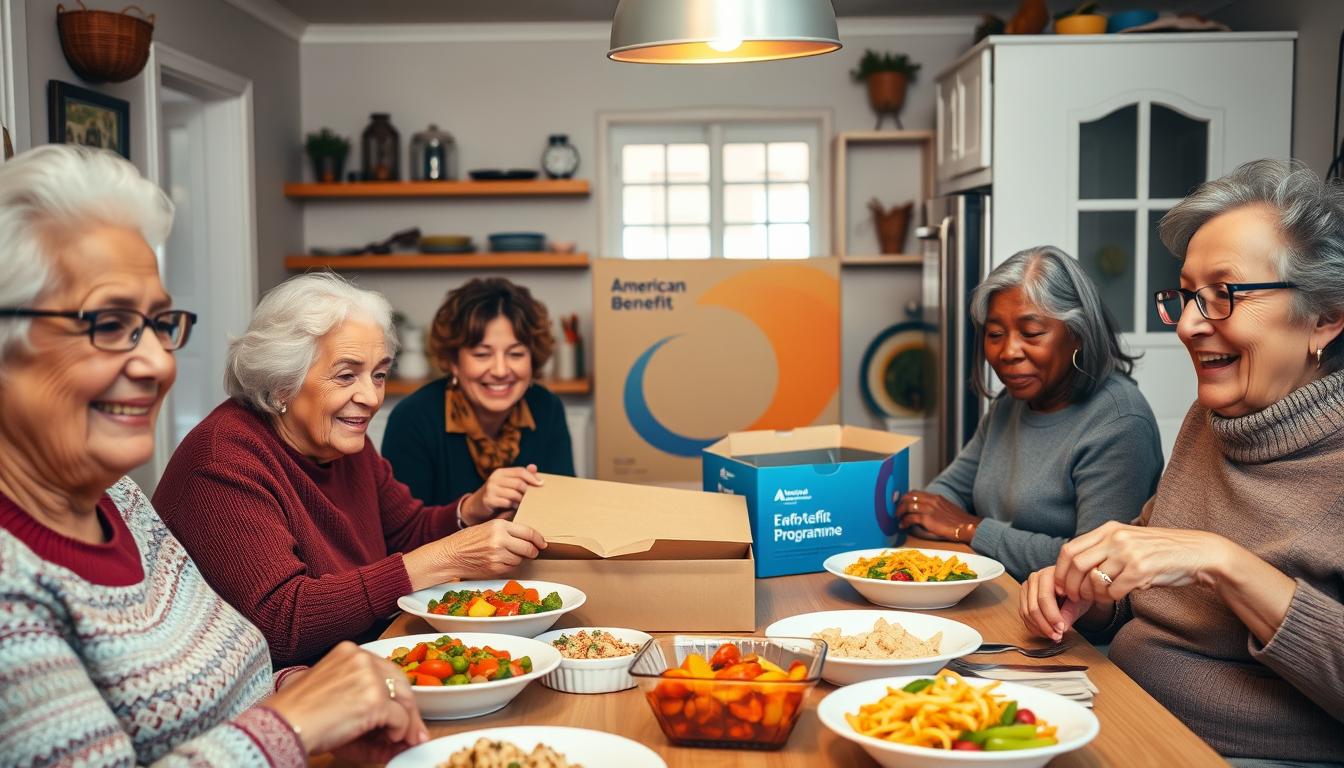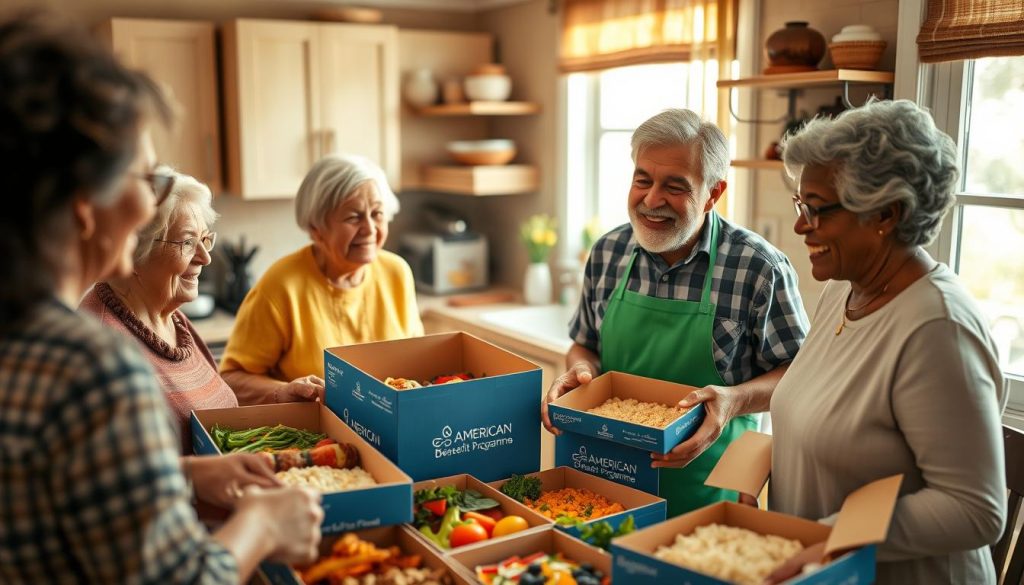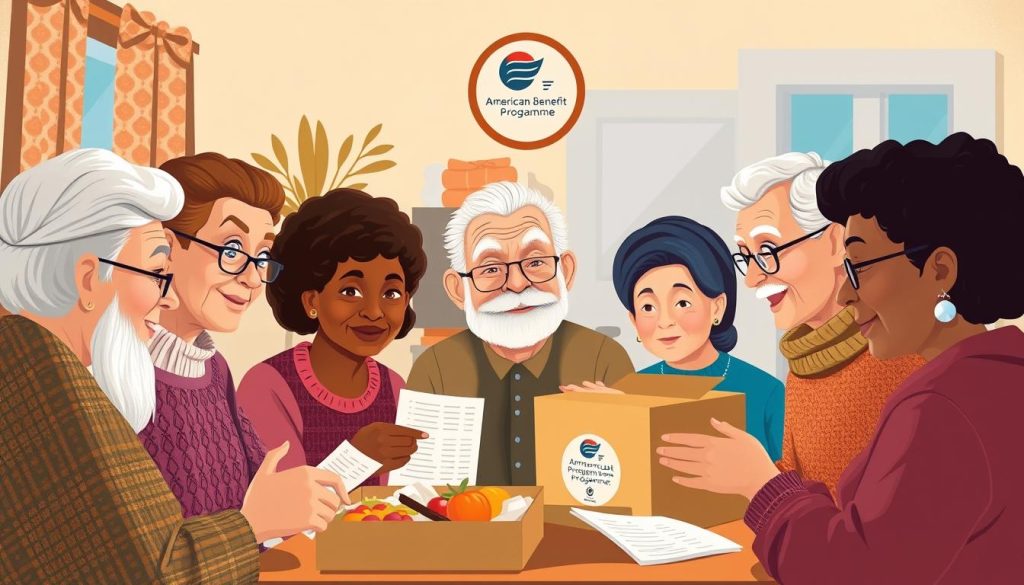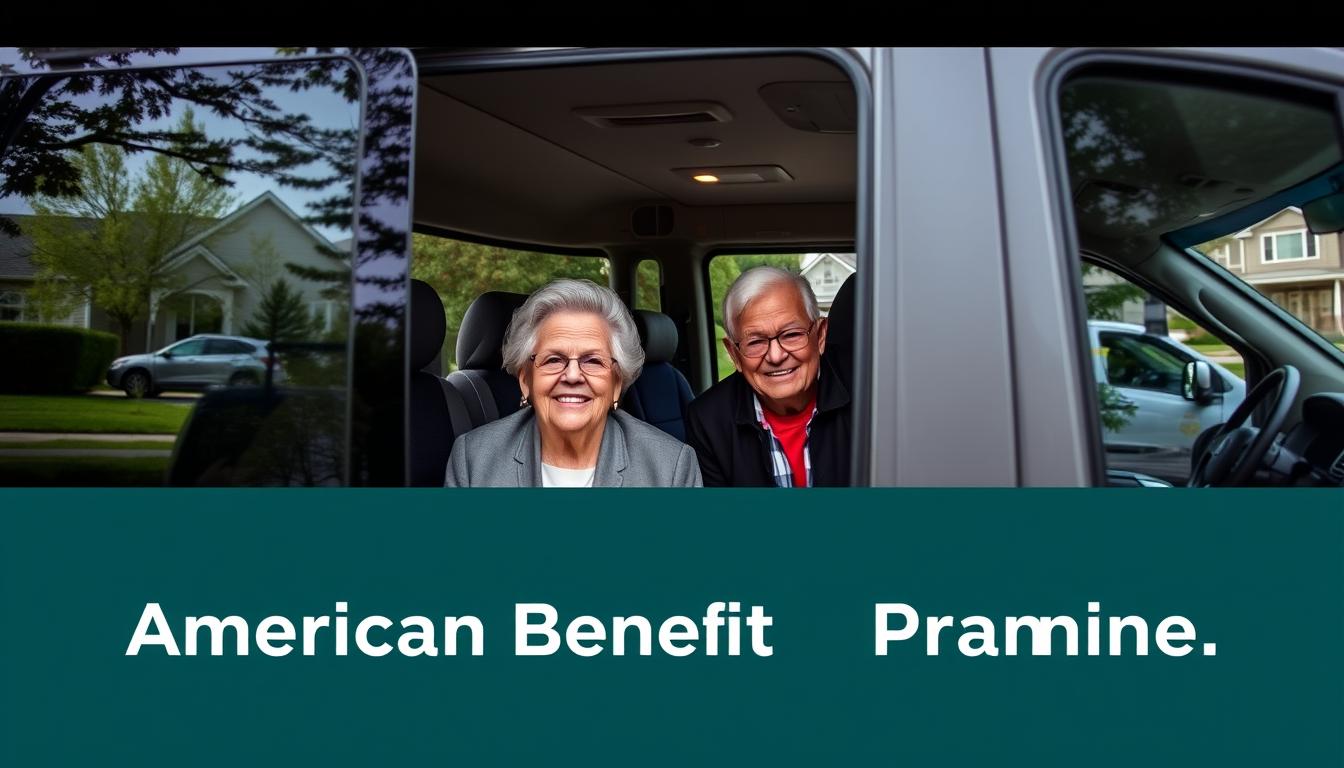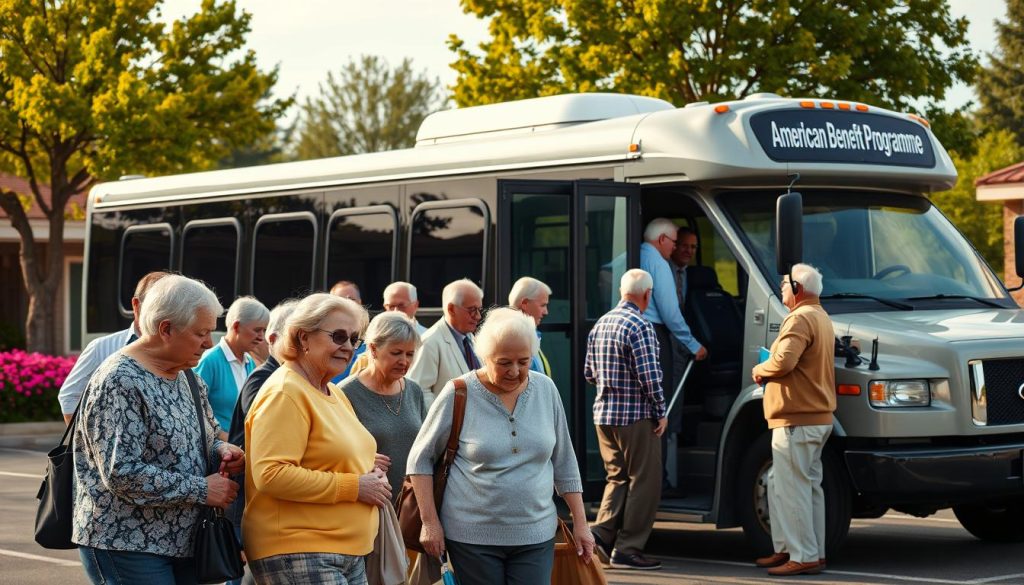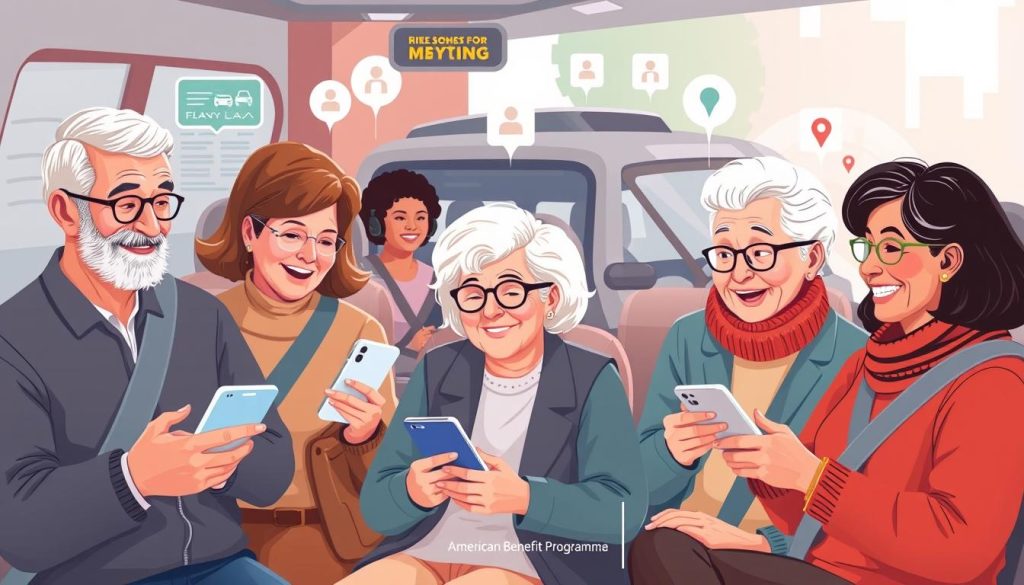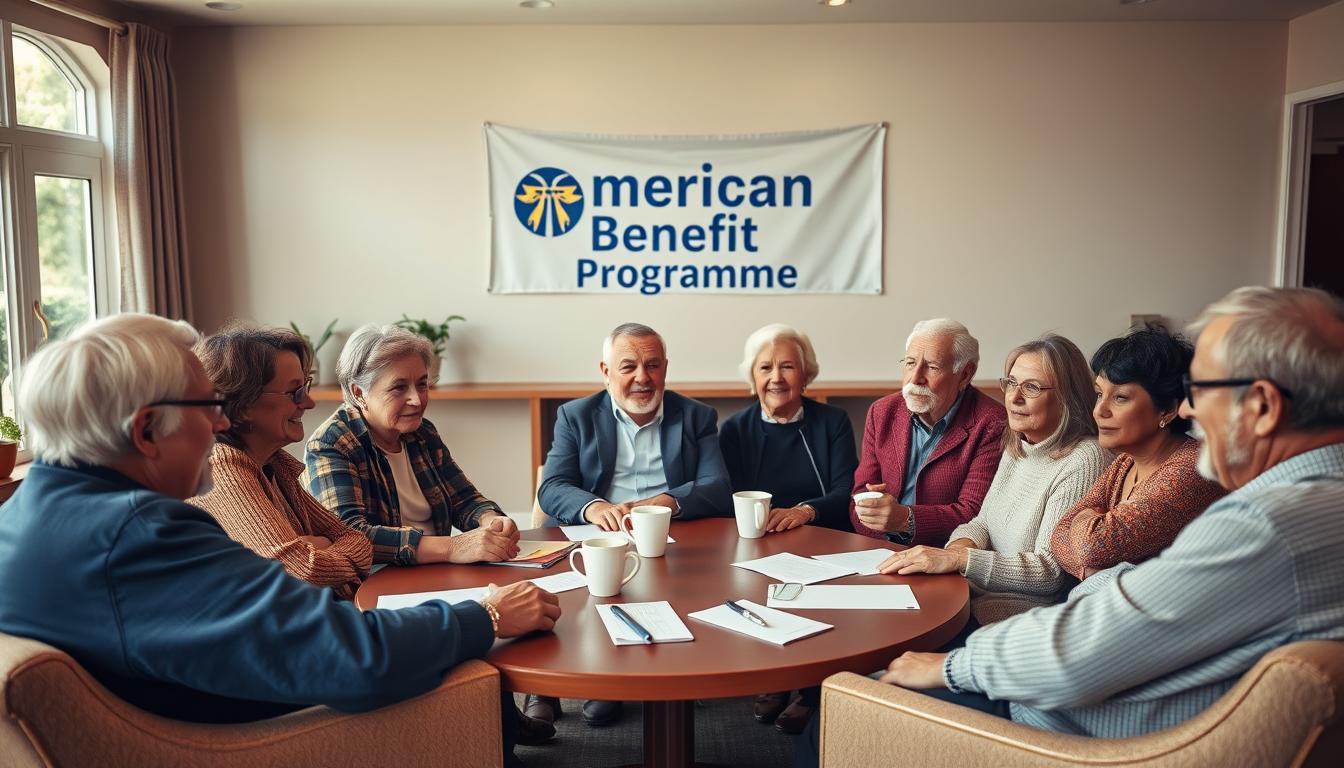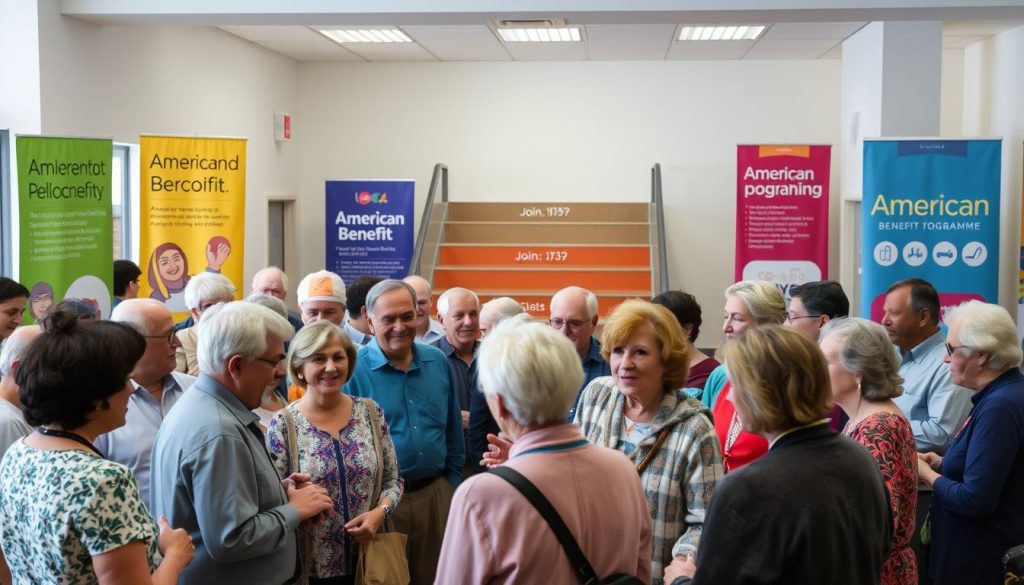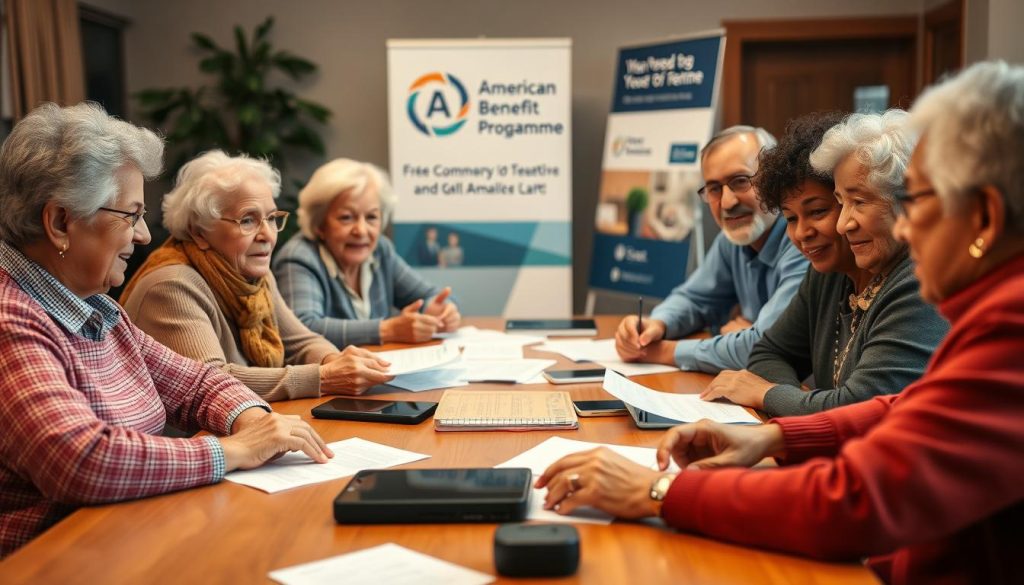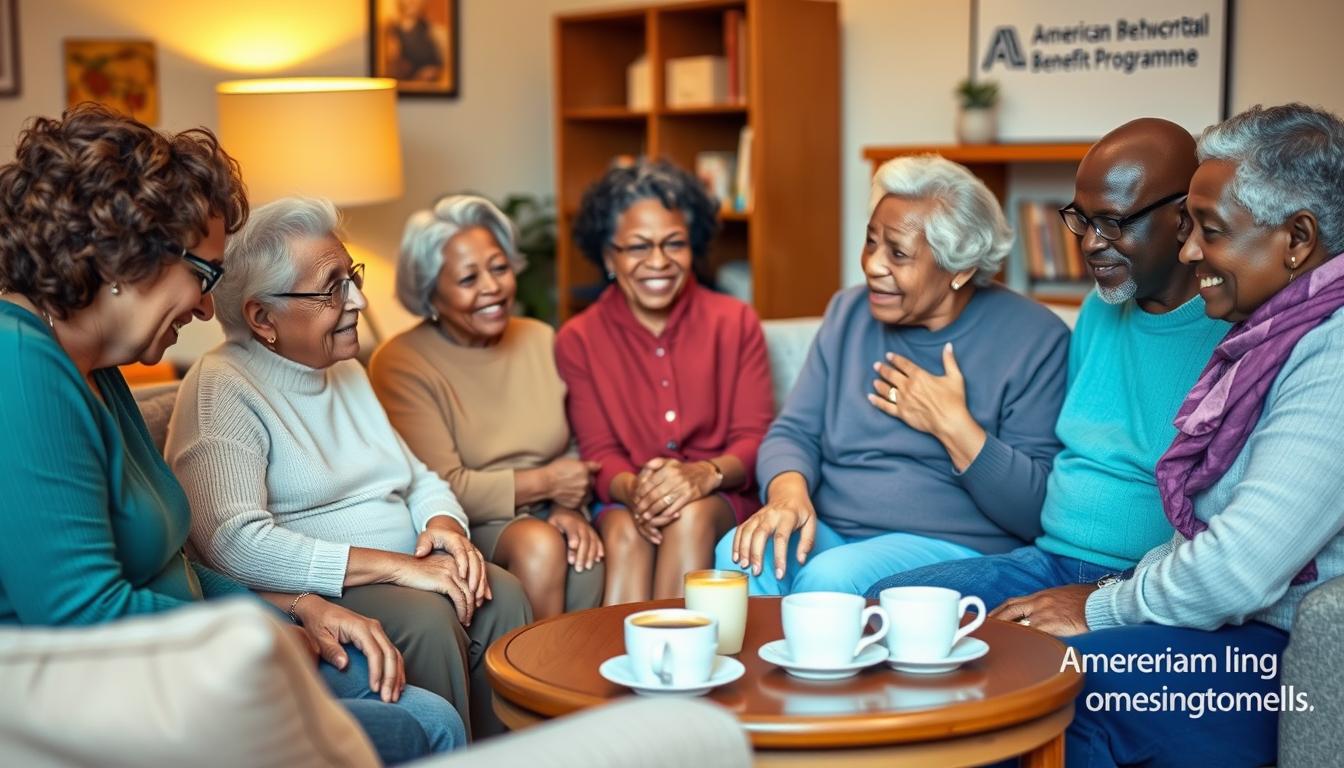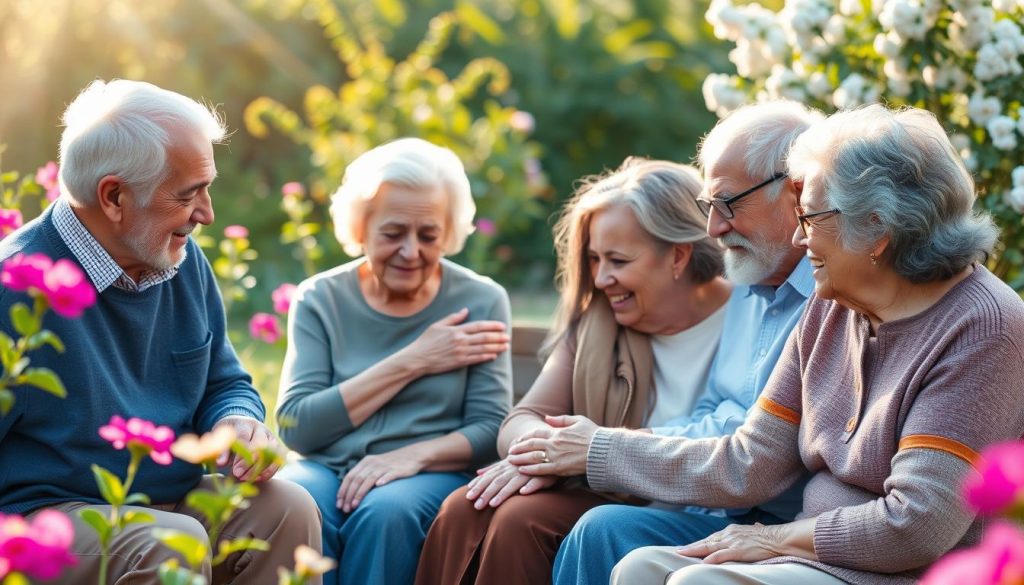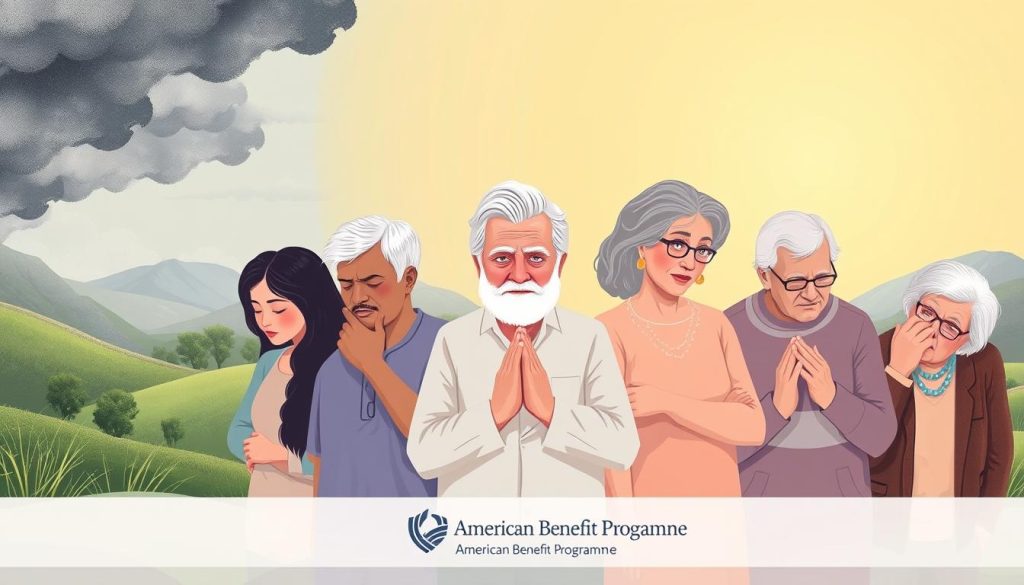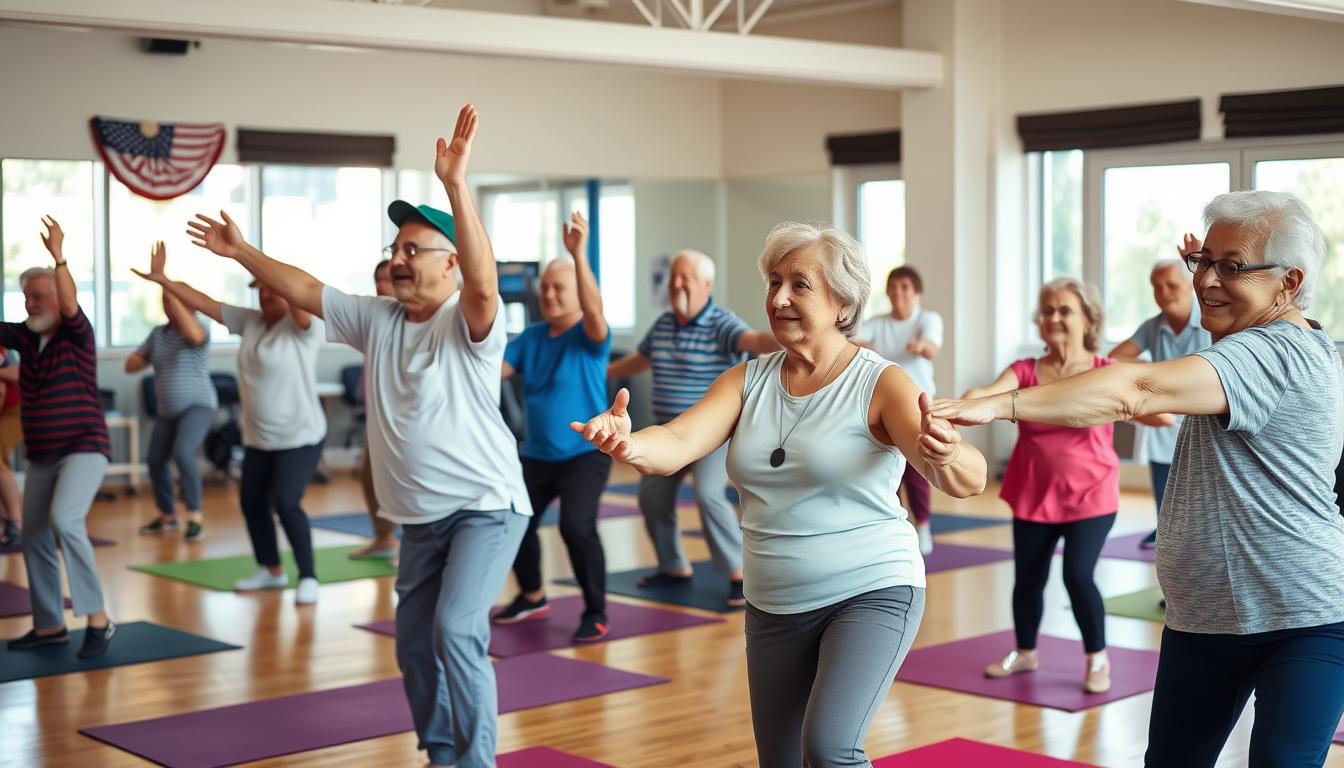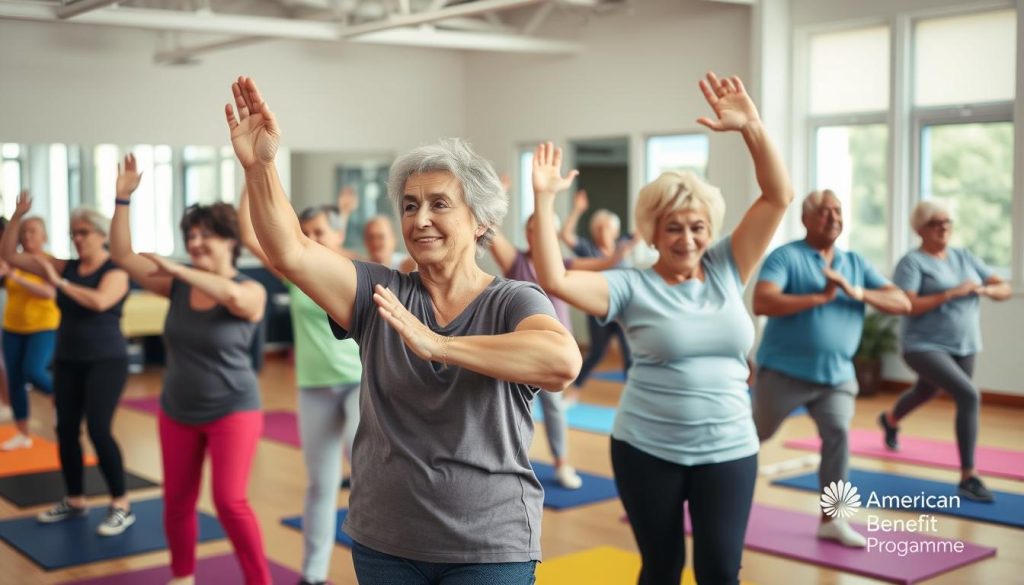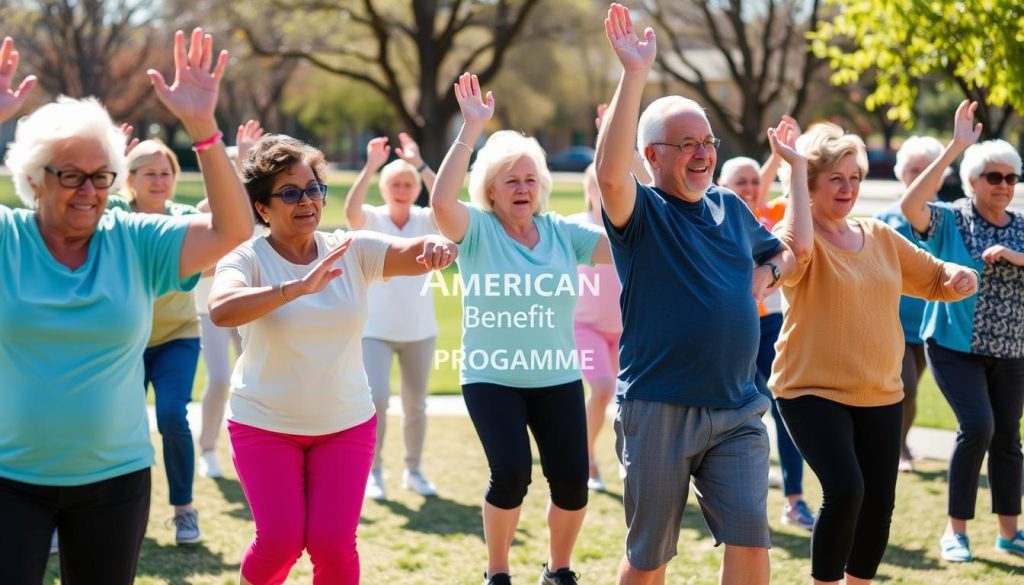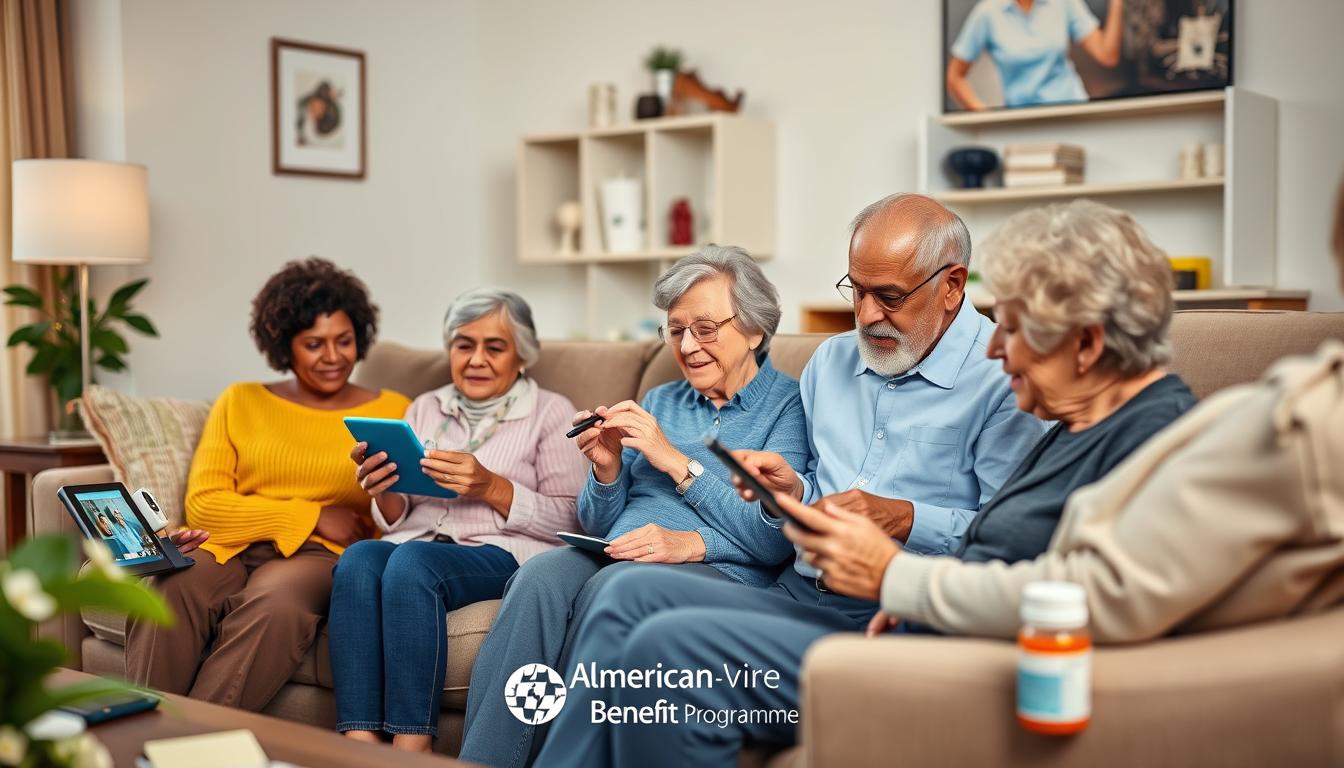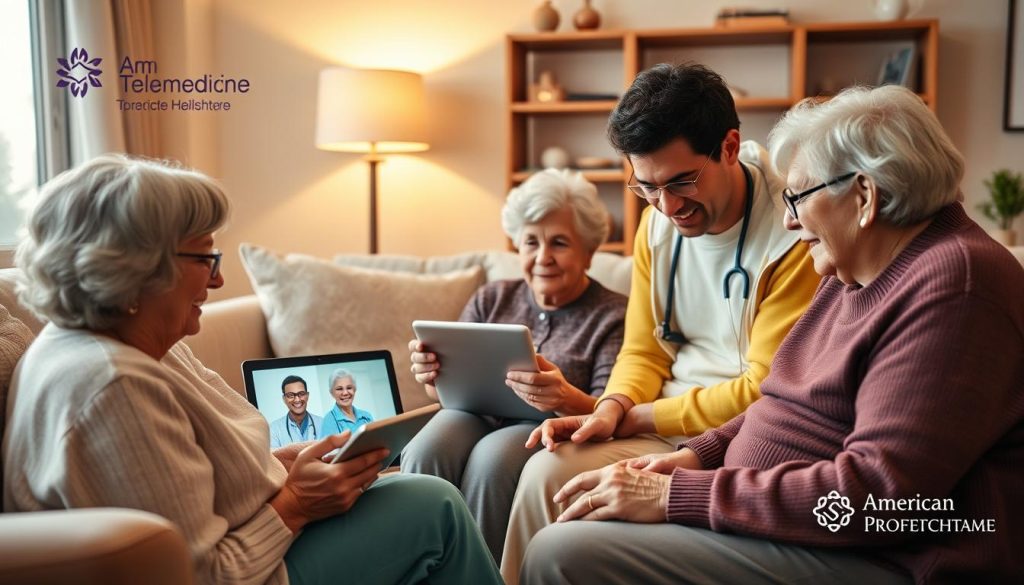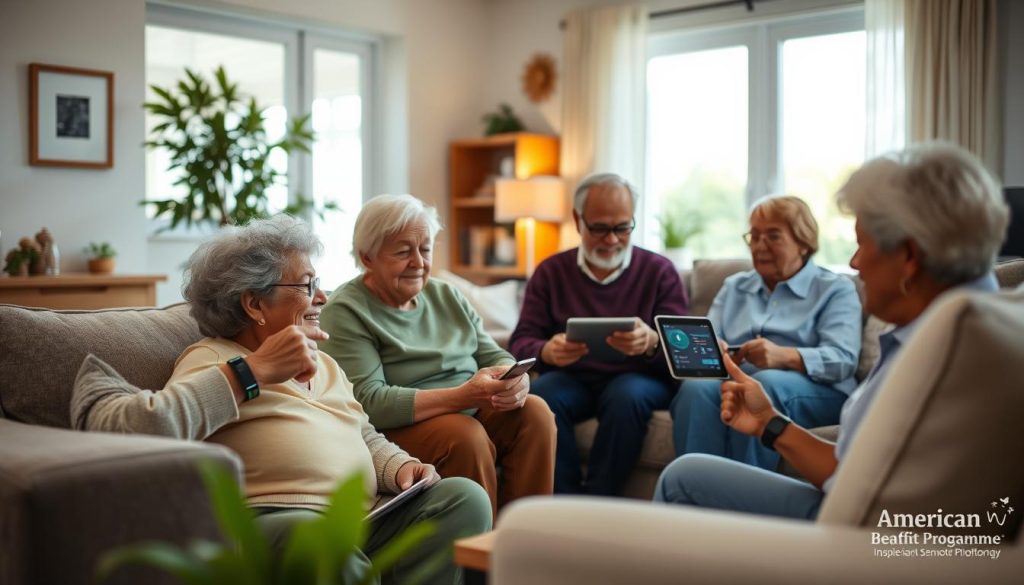Have you ever thought about the power of group talks for older people?
Being part of elder peer support groups does more than provide company. It is key to making strong emotional bonds. These bonds make the golden years brighter. As older folks increasingly need emotional support, these groups are their safe space. They find friends, understanding, and shared advice here1. Thus, the value of these meetings is quite clear.
These groups are not just for chat. They help build skills to better manage health issues1. This article makes it easy to find and join such important groups. It helps every senior find the warmth of friendship.
We will talk about different group types and what you can expect. We aim to help you enjoy the benefits of these connections.
Key Takeaways
- Elder peer support groups significantly reduce feelings of loneliness and isolation.
- These groups foster improved emotional well-being among aging adults.
- Participation can enhance coping mechanisms for managing health conditions.
- In-person interactions are generally more effective for emotional expressions compared to online settings.
- Resources are available to help locate local and online support groups.
- Understanding group structures can improve overall participation and satisfaction.
Understanding Elder Peer Support Groups
Elderly peer support groups are like clubs where older people meet. They help seniors who face similar problems. These groups are great for making friends. They help with feeling less lonely.
People talk about their lives. This sharing helps everyone feel understood. It makes a warm and friendly place for all.
What Are Elder Peer Support Groups?
These groups are meetings where older adults come together. They share their stories and support each other. It’s like having a group of friends to chat with.
A leader often helps the conversation. This helps members find emotional support. Friends in these groups make everyone feel happier. Studies show they help avoid feelings of loneliness2.
Why Are They Important for Aging Adults?
Being alone is a big problem for many seniors. It can make them very unhappy. Elder peer groups help solve this by bringing people together.
Meeting friends can keep the mind sharp. It also makes seniors feel they belong. Many feel happier in places where they have friends2.
These groups create strong friendships. These friends can make life much better. Being part of a group is very helpful for seniors.
Benefits of Joining Elder Peer Support Groups
Older adults find many good things in joining elder peer support groups. They get to make new friends and share their feelings. This helps them feel happier and more connected.
Emotional Support and Companionship
Many older adults often feel lonely. Being part of an emotional support group helps take away their loneliness3. They talk about their lives and find friends who care. This helps remove their fear of being alone.
Shared Knowledge and Coping Strategies
These groups teach older folks how to deal with health issues and sad times3. People exchange tips and advice. This helps everyone live better and make smart choices about their health.
Reducing Feelings of Isolation
Loneliness can make older people choose bad foods and feel very sad3. Being in groups makes them happier and more confident. They feel part of the world and their community.
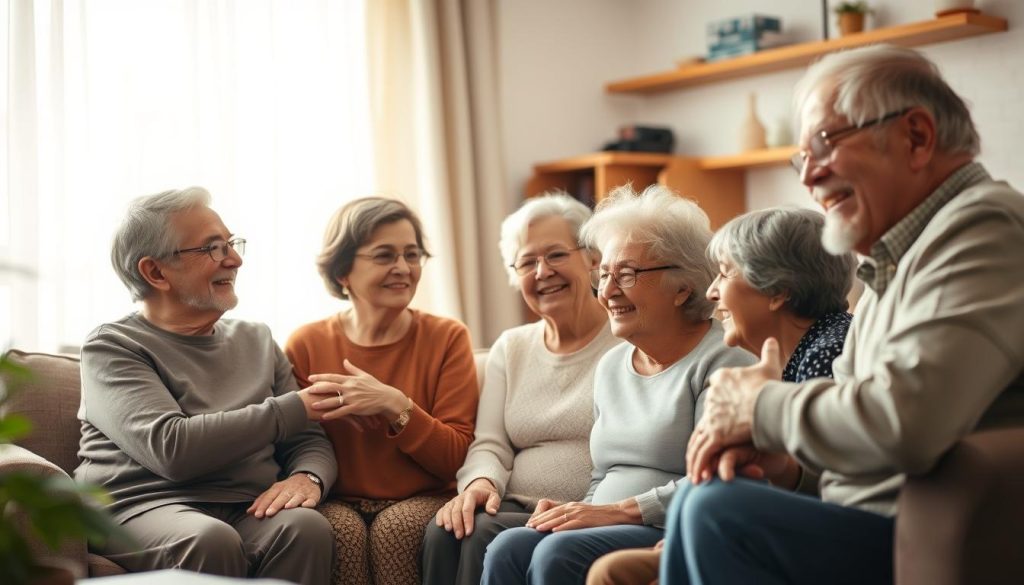
The Towers at Golden West has clubs for walking and talking about books3. These groups make the community stronger and everyone healthier. They help everyone talk more and support each other.
Learn more about the positive impact of peer support on older adults
Types of Elder Peer Support Groups
Elder peer support groups come in many shapes, to fit different needs. Each one gives a place where people can meet, share, and get support.
Mutual Support Groups
Mutual support groups build community. Members share experiences and support each other. This creates strong bonds.
These groups often run on volunteers. This makes them welcoming to everyone.
12-Step Programs
12-step programs help seniors with substance issues. They focus on recovery. Members connect with those facing similar struggles.
This helps fight loneliness and promotes accountability.
Therapy Groups
Therapy groups are led by licensed pros. They offer targeted help. These groups deal with issues like grief or depression.
They mix peer support with therapy. This helps members heal and understand.
Online Support Groups
Online groups are great for seniors with limited mobility. They offer flexibility and convenience. Seniors can join from home without worry about location.
Want to learn more about elder peer support groups? Check out more resources here4. Joining can greatly improve life quality. It helps with loneliness and boosts well-being.
How to Find Elder Peer Support Groups
Finding the right elder peer support groups can really help older adults feel better. To find these groups, you can use different resources. Try checking local community centers, talking to doctors, or contacting organizations that help the elderly.
Resources for Locating Support Groups
There are many places seniors can look to find good support networks:
- Local community centers often have elder support groups. They can tell you when and what they talk about.
- Doctors usually know about local support groups. They can suggest where to go for help.
- Organizations focused on older people sometimes have lists of groups you can join.
- Programs like the Oregon Senior Peer Outreach are for seniors in faraway places. They offer weekly calls to make seniors feel less alone5.
- SAMHSA has a list of support groups across the country. This gives seniors many options to choose from6.
Questions to Ask Before Joining
Before you decide on an aging adults support group, there are important questions to ask:
- What is the structure of the group like? Knowing this lets you understand what to expect.
- Who runs the group? Finding out about the facilitator’s experience can make you feel more comfortable.
- How often are the meetings? The frequency affects how well the group works together.
- What are the privacy rules? It’s important to know your conversations are private.
Asking these questions helps people find a group that meets their needs and feels welcoming.
By asking the right questions, you can make sure you find a supportive group that fits your needs well.
Talking and asking questions leads to finding great support. It helps build friendships and a helpful community576.
What to Expect from Elder Peer Support Groups
Elder peer support groups are welcoming places for seniors. They can talk about their lives and problems. The groups meet in different ways. This could be face-to-face, online, or in talks led by trained people. They make sure everyone feels okay and involved.
Meeting Formats and Structures
Meetings often start with everyone introducing themselves. This helps people get to know each other. Then, they talk about things that matter to them. They set rules to make sure everyone feels safe talking. These rules keep talks private and let everyone share freely. This is very important for making people feel supported.
Ground Rules and Confidentiality
It’s very important to talk kindly with each other in these groups. Setting rules helps everyone feel important and safe. Keeping things private means people can share without worry. This makes trust grow. It lets people talk about hard times and good times. Older people feel less alone because of these groups. Studies show that around 70% of older adults feel less lonely after joining8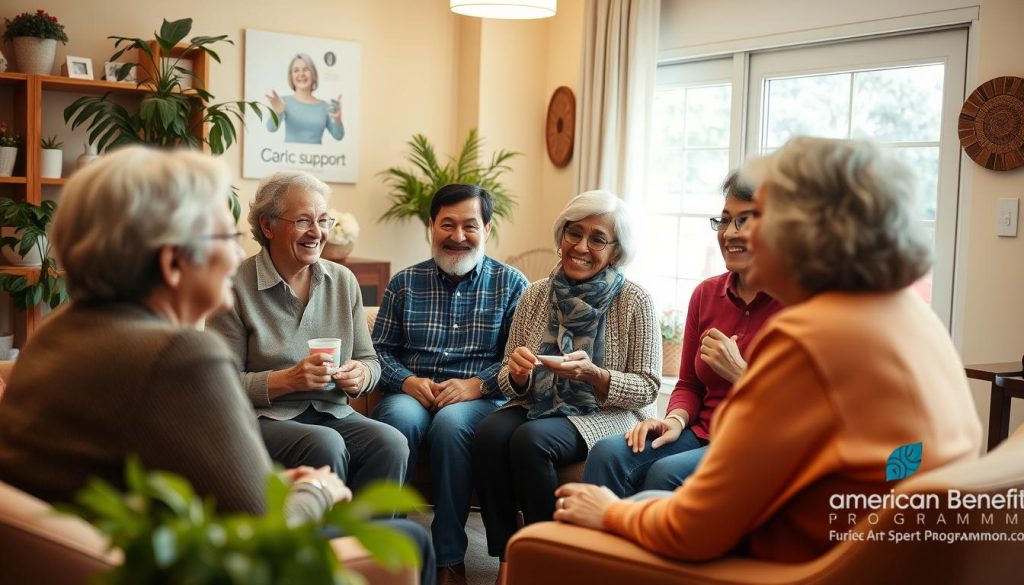
Getting the Most Out of Your Experience
Talking in groups helps you get more from elder support meetups. Sharing stories adds value, making the group bond stronger. It helps everyone understand each other through shared stories.
How to Engage in Discussions
Here are ways to make talks better:
- Share your stories when you feel okay. It makes others want to share too.
- Really listen, giving others space to talk about their feelings and thoughts.
- Ask questions that don’t have a yes or no answer. It helps explore new views.
- Be okay with different opinions to keep the group supportive, which is key for elder friends.
Setting Personal Goals for Participation
Setting goals helps you in support groups. You could aim to:
- Get better at talking, which helps you connect better.
- Look for emotional help, which is important for personal issues.
- Make real friends, feeling more like you belong.
- Learn new ways to handle daily challenges.
Having clear goals for your group time leads to a better experience. This means growing personally and making the group a comforting place. It makes everyone feel they belong and gives hope in life.
Potential Challenges of Joining Support Groups
Joining support groups for elders can be life-changing. But, some people hesitate because of wrong beliefs. It’s important to clear up these myths to help more people join.
Addressing Common Myths and Misconceptions
Some folks think they’ll be judged in these groups, but that’s not true. Elderly support groups are safe and welcoming. They help people share feelings without fear.
It’s key to fix these wrong ideas so more seniors feel good about joining.
Understanding Emotional Triggers
Knowing what makes you feel strong emotions is important. Elder groups focus on being mindful and knowing yourself better. This helps everyone feel better and grow personally.
In these groups, people learn how to deal with tough feelings. They learn from each other and feel less alone. This helps change bad beliefs about old age groups. It makes more people want to join910..
The Role of Facilitation in Elder Peer Support
Facilitation is key to successful elder peer support groups. A trained facilitator keeps conversations respectful and flowing. They play a crucial role in directing discussions and managing how the group works. Their skills make a space where elders can support each other emotionally.
Importance of a Trained Facilitator
Trained facilitators know how to deal with conflicts in discussions. They help members figure out what they need and get everyone involved. This boosts the group’s impact. Their leadership makes sure everyone talks openly, sharing feelings and experiences. They also make sure group rules are followed, so all feel safe to speak up. Research shows that peers in assisted living feel less alone and healthier mentally. Also, older people in these groups often meet their goals and feel better overall11.
Ensuring Safe and Supportive Environment
A supportive environment is vital for elder peer support benefits. Facilitators work to make a space where everyone is valued. They use methods that let members share experiences, cutting down on loneliness. In such spaces, people feel better emotionally and have higher self-esteem11. A good group helps seniors make decisions together. This builds a strong community of seniors helping each other12.
Conclusion
Elder peer support groups are great for older adults. They help improve emotional and social health. By talking and spending time with others, they feel less alone13..
These groups also help seniors stay active and happy. Regular meetings and phone chats have shown good results. It makes life better for seniors looking for friends.
The groups welcome everyone, making sure all can join. This means people from different places can find support. Sharing stories and advice makes life richer for them14..
Joining these groups leads to new friends and better mental health. It’s about making the community stronger. It’s good for everyone to join in. It leads to a happy life as we age. Here’s more on staying strong and.
Source Links
- Joining Senior Support Groups for Seniors
- Why Peer Support Matters In Senior Living Settings
- The Importance of Social and Support Groups for Older Adults
- Senior Peer Program — Polara Health
- Senior Outreach – Community Counseling Solutions
- Find a Support Group or Local Program
- Resources for Older Adults
- Peer-to-peer support model to improve quality of life among highly vulnerable, low-income older adults in Cape Town, South Africa
- Preserving the Heart of Peer Support: The 8 Interrelated Challenges
- A community-based peer-support group intervention “Paths to EvERyday life” (PEER) added to service as usual for adults with vulnerability to mental health difficulties – a study protocol for a randomized controlled trial
- Peer Supports Influence on Assisted Living
- Peer-Facilitated Decision-Making in Mental Health: Promises, Pitfalls, and Recommendations for Research and Practice
- Key Elements and Mechanisms of a Peer-Support Intervention to Reduce Loneliness and Isolation among Low-Income Older Adults: A Qualitative Implementation Science Study
- Older Adult Peer Support Specialists’ Age-Related Contributions to an Integrated Medical and Psychiatric Self-Management Intervention: Qualitative Study of Text Message Exchanges
